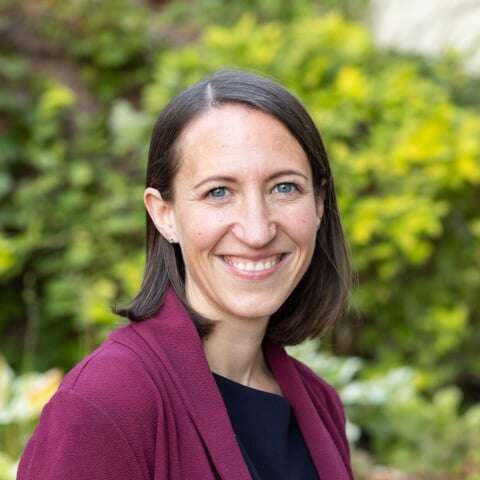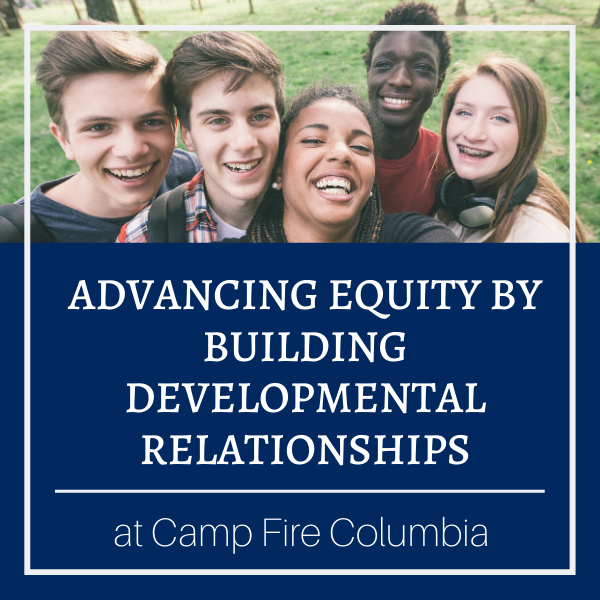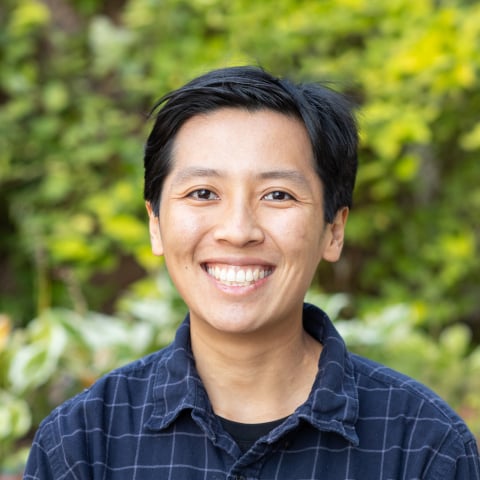Blog
Search Institute Spotlight: Meet Ashley Boat
Dr. Ashley Boat is Senior Research Scientist at Search Institute. In this spotlight, she discusses the power of research-backed practical solutions, youth social capital, and the importance of measurement with regard to relationships and thriving.
As a former teacher, turned research scientist, how do you see your work closing the gap between research and practice?
As a former teacher who transitioned into the role of a research scientist, I am deeply committed to translating research into meaningful and impactful practice. While I was a teacher, I noticed that there was sometimes a lack of alignment between what research suggested was effective and what was feasible in the day-to-day reality of teaching. I wanted to make sure that the research-backed strategies I was implementing in my classroom met the needs of my students and the families I worked closely with. My own experiences as a former teacher have reinforced the significance of this approach and my recognition of the critical importance of ensuring that research findings are not just published in academic journals, but are actively translated into practical solutions that can benefit educators, youth-serving professionals, and the youth they work with and for.
In my current role at Search Institute, we are dedicated to serving as a connector between the world of research and the everyday practices that impact the lives of practitioners and the young people they serve. One of the fundamental pillars of our approach at Search Institute is the incorporation of practitioner and youth voices into our research. We firmly believe that those who are on the frontlines of education and youth development possess invaluable insights that can shape and inform the field’s research agenda. By actively partnering and engaging with practitioners and youth, we gain a deeper understanding of the real-world challenges they face and the context in which our research findings will be applied. We do so by engaging in collaborative partnerships with practitioners, communities, and youth so that we can co-create strategies and resources that are grounded in the realities of their unique context and needs. This approach is not just a professional commitment, but a personal one, rooted in my own experiences in the classroom and my unwavering belief in the value of high-quality research to support positive change in the lives of youth.
As we look at advancing the field of positive youth development, can you describe the role of evaluation and measure development?
Evaluation and measurement can advance the field of positive youth development by serving as useful tools for informing, improving, and adapting programs and practices. Without monitoring impact and progress, it is difficult to know what is working and what may need to be adapted or improved in order to ensure all youth can thrive and reach their life goals.
Effective measurement can be used to gain insights and an understanding of young people’s experiences, as well as how young people’s perceptions and behaviors may change over time or as a result of a program or practice. Search Institute has a long history of working closely with schools and youth-serving organizations to create practitioner- and youth-centered measures that can provide valuable insights on ways to strengthen the impact of a program or practice on youth outcomes, while also ensuring that all youth are being equitably supported. For example, in 2021 we had the opportunity to partner with six innovative youth and young adult-serving organizations (i.e., Basta, Beyond 12, Braven, Climb Hire, COOP, and nXu), all who were focused on strengthening social capital and positive relationships among the young people they served. We worked closely with these partners over a year and half to develop a suite of measures that could be used to help them better understand what impact they were having on young people’s social capital development. To ensure the measures were relevant, practical, and inclusive, we worked closely with our partners including program staff, alumni, and current youth participants to conduct focus groups and interviews to better understand how each program supported youth social capital development. These measures helped illuminate the program components that have the greatest impact on young people’s relationship-building efforts so that they could be further leveraged and improved. Furthermore this work helped us inform and create the foundation for our Social Capital measures.
Effective measurement is often a key feature of an evaluation. Evaluation can be used to help establish preliminary evidence for the effectiveness of a program, to identify strengths and areas of growth that can enhance program quality and impact, and to optimize or adapt practices to ensure they are meeting the unique needs and circumstances of different youth populations and communities. Most recently, we partnered with DREAM’s Village Mentoring program to better understand the key mechanisms within their program that lead to positive youth outcomes. Through the evaluation, we found that a strong sense of belonging and strong developmental relationships with program staff and peers were essential in order for youth to experience growth in their social-emotional competencies, self-esteem, and hopes for the future. Fortunately, these are all malleable program features that can be further strengthened to have an even greater impact. We will continue to work closely with DREAM to identify ways that insights from the evaluation can be leveraged to further strengthen their positive impact on the lives of the youth they serve.
During the last few years you have been working on projects focused on Social Capital, defined as: the resources that arise from a web of relationships, which people can access and mobilize to help them improve their lives and achieve their goals. Can you share the importance (or why) of measuring Social Capital and how data can drive action?
Understanding relationships – whether it is young people’s relationships with teachers, parents, mentors, or their peers – has always been at the heart of my research at Search Institute. Like many others, I can reflect back on my life and think of the ways different relationships in my life played a significant role in helping me make progress towards a dream, ambition, or life goal. This personal reflection is well-aligned with Search Institute’s decades-long research that has highlighted the important role strong developmental relationships play in young people’s lives. Now imagine surrounding youth with a web of supportive relationships that can open doors to new opportunities, connections, and other forms of support.
Youth social capital can also be a powerful lever for creating systems level change so that all young people can thrive and reach their full potential. Our research has shown that young people who report higher levels of social capital from peers and near-peers tend to also report a greater commitment to paying-it-forward to other young people within their communities and a greater collective efficacy to ensure systems that pave the way to education and career opportunities are more just and equitable.
As shared above, measurement can be a useful tool for helping schools and youth-serving organizations better understand the experience of the young people they serve. Without hearing from youth about their experiences with different relationships in their lives and how these various relationships support them or don’t support them, it is hard to know what strengths and assets exist, as well as where there may be opportunities for growth and improvement.
It is important to not just collect data for the sake of collecting data, however. Data is most useful when it can be used to better support young people. In order to successfully use your data findings to drive impact, an important first step is to reflect and make sense of findings through dialogue and meaning-making activities with youth, families, and your community. However, at Search Institute we recognize that thoughtfully using social capital data to inform and/or improve your efforts and practices is no easy feat. It can be challenging to know how to make sense of data and how best to respond to insights and findings in ways that will have a meaningful and lasting impact.
To better support practitioners in using their social capital data to drive program and practice improvements, we are currently co-developing a new tool alongside six youth- and young-adult serving organizations. Through a guided approach, this tool will equip organizations and practitioners in gaining insights into how their organization supports youth in building transformative relationships and connections and will provide practical solutions to support them from moving from data to action. Our team cannot wait to share more about this tool over the coming months.
What are ways organizations can support youth social capital development and what role do relationships play?
In order to better support schools and youth-serving organizations in identifying the ways they can promote young people’s social capital development, we have been conducting research to identify the core features of what makes an organization a “social capital promoting organization” or an organization that is committed to and effective in supporting young people’s social capital development.
Many of the ways that organizations support youth in building positive relationships and social capital are consistent with what research has found to be features of high-quality youth programs. This often includes creating a relationship-rich space where both adults and young people can build strong relationships with one another. There are many characteristics that feed into creating a relationship-rich space for a web of relationships to flourish, but a couple of worth highlighting include:
- Build community partnerships. Youth-serving organizations can build collaborative partnerships with families, organizations, schools, and businesses within their community. These partnerships expand an organization's own network and can yield access to additional resources and opportunities for both organizational capacity-building and young people’s positive development.
- Provide youth with opportunities to explore sparks. Sparks are the deep interests, skills, or talents that a young person has. Youth thrive when they have the relational support to ignite and support their spark. One way that youth-serving organizations can support youth social capital development is connecting youth to opportunities and resources that align with their spark.
- Provide role models and leverage near-peer relationships. Role models and near-peers (slightly older and/or more experienced peers who serve in mentorship or coaching roles) can inspire young people in reaching their life goals, while also serving as connectors to a larger network of additional relationships and resources. It can also be particularly beneficial when young people see someone who looks like them or someone with similar life experiences as them reach similar goals.
- Instill a value of paying-it-forward. Youth can also support one another in building their network. It is important to encourage and support positive relationship-building among peers. When organizations do invest in fostering peer-to-peer networks, many youth not only develop a strong web of peer support, but also feel a sense of commitment to wanting to pay-it-forward to their fellow peers. For example, one of our studies found that many young people who were past participants in their respective programs returned to their programs later in life to either serve as staff or mentors to new participants.
What would your ideal day off include?
My ideal day off would start with a morning run followed by a cup of coffee and a good book. The rest of the day would be spent with my partner, Brandon, and our two kiddos, Arie (age 4) and Malcolm (age 2). We most likely would spend the day in one of Minneapolis’s many parks or exploring a new playground while enjoying many tasty snacks. I might cap the day off by cooking an extravagant meal and enjoying a good movie.
During her four years at Search institute, Ashley has focused her research on advancing our understanding of how a web of developmental relationships promotes the wellbeing of young people. Some of her projects include Social Capital Assessment + Learning For Equity (SCALE) measures, enhancing education and career pathways through peer and near-peer social capital, and Mentoring Relationships as Catalysts for Strengthening Youth Social Capital: Findings from DREAM’s Village Mentoring Program. Learn more about Ashley by reading her bio.



